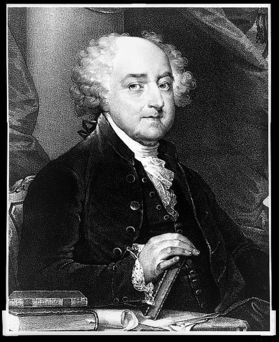John Adams
John Adams (1735-1826) was an American Foundiung Father and President 1797-1801. He founded the Adams political family based in Massachusetts. Adams was a political leader of the American Revolution and one of the drafters of Declaration of Independence. He was the first American minister to Britain, and was elected as the first Vice President of the United States under President George Washington and served from 1789 until 1797.
In the presidential election of 1796, Adams, on the ticket of the Federalist Party, defeated the Democratic-Republican nominee Thomas Jefferson and became the second President of the United States. He served until 1801, after he lost to Jefferson in a rematch. His presidency was marked by the quasi-war between the United States and France, the XYZ Affair, the founding of the U.S. Navy, the passage of Aliens and Sedition Acts, peace with France, and the appointment of John Marshall as Chief Justice.
He was a cousin of another revolutionary Samuel Adams, and father of the sixth U.S. president John Quincy Adams.
Early life
John Adams was born in Braintree, Massachusetts on October 19, 1735. He was educated at Harvard College and graduated in 1755. He then studied law, was admitted to the bar in 1758, and practiced law in Suffolk County.
Revolutionary activities
Adams was an opponent to the Stamp Act passed by the British Parliament and joined the Sons of Liberty. However, after the Boston Massacre of 1770, Adams served in defense of the British soldiers who conducted the shootings and six of them were acquitted as result. He was a delegate in both the First and the Second Continental Congresses. He also helped the drafting, and was a signer of the Declaration of Independence. During the Revolutionary War, he went to France and Holland as a diplomat and helped negotiate the peace treaty.
Vice President
Adams as the vice president did not exert much executive power due to constitutional limits and his own reluctance to wield authority. His relationship with the president was friendly but distant since Washington mainly sought advices from his cabinet.
However, serving as the President of the Senate, he casted 29 tie-breaking votes, a record that has yet to be broken by his successors. These votes included ones on very important issues such as preventing a war between U.S. and Great Britain.
Presidency
Supreme Court appointments
John Adams appointed three justices to the Supreme Court. They are Bushrod Washington, who was George Washington's nephew, Alfred Moore, and Chief Justice John Marshall, who was instrumental in initiating the process of judicial review.
Later life and legacy
Adams largely retired from politics after stepping down from the White House. In 1820, however, he served as a delegate to the constitutional convention of Massachusetts. He resided in Quincy, Massachusetts in his later life and died there on July 4, 1826.
The naval ship USS John Adams SSBN620 was named after John Adams.
References
- Congressional Biographical Directory
- White House biography
- Boston Massacre - 1770
- U.S. Senate Art and History biography
